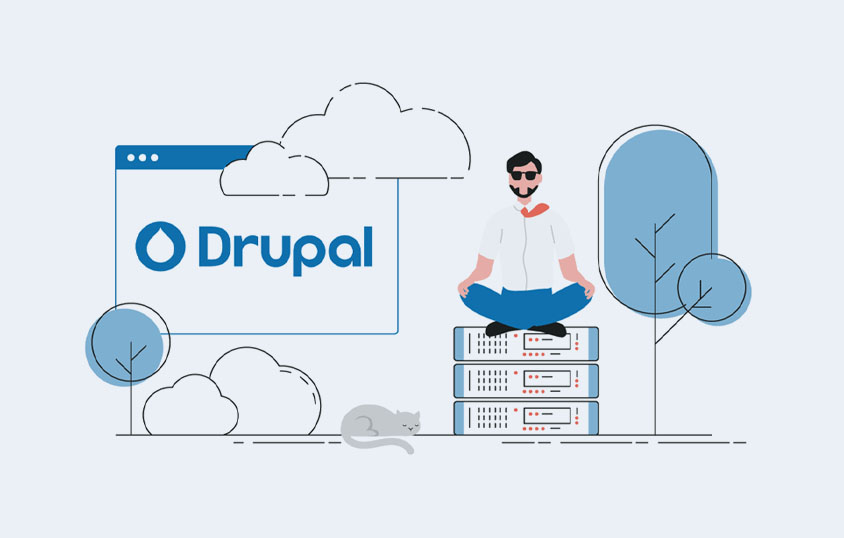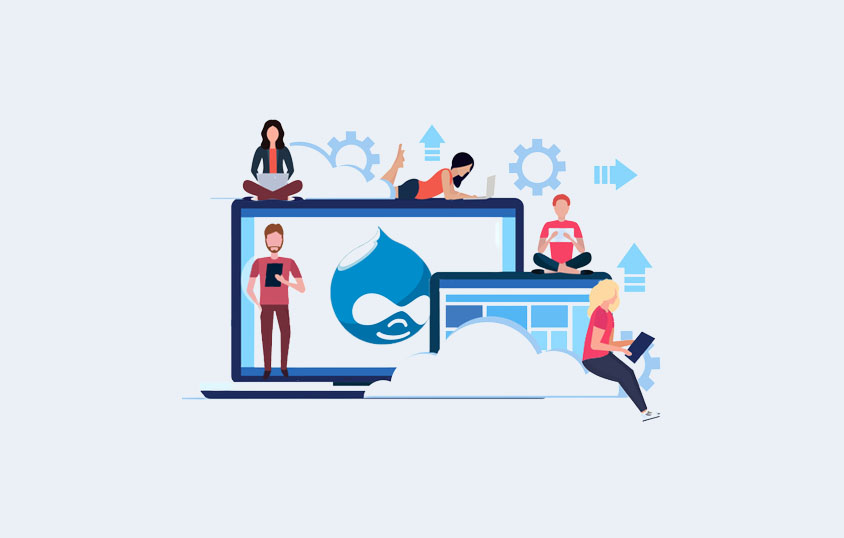Content
Recent Posts
Drupal Hosting Providers: Build a Scalable Website

If you’re searching for a content management system (CMS) that balances flexibility, security, and community support, Drupal deserves your attention. But even the most powerful CMS needs the right web host to thrive. Choosing the right Drupal hosting services determines how fast your site loads, how secure it remains, and how easily it scales.
In this guide, you’ll learn what Drupal is, the main types of hosting available, key providers and their prices, and the reasons many website owners choose Drupal for projects of all sizes.
Content
What Is Drupal?
Drupal is an open-source CMS written in PHP that lets you build everything from simple blogs to enterprise-level websites. It stands out for its ability to manage complex content types, custom permissions, and multi-language sites. You can extend Drupal with thousands of modules and themes, giving you a wide range of features for near-limitless customization.
This power comes with a learning curve. Drupal often requires more technical knowledge than beginner-friendly platforms like WordPress, but it rewards you with stronger scalability and advanced features. For developers and businesses planning large or content-heavy projects, Drupal’s flexibility is a major advantage for those seeking the best Drupal hosting options.

Types of Drupal Hosting
Not every hosting environment handles Drupal equally. Understanding the main types of hosting will help you match your site’s needs with the right setup.
Shared hosting
Shared hosting places multiple websites on the same server. It’s the most affordable option and works well for small blogs or personal projects. Providers typically include one-click Drupal hosting plan installation, free SSL certificates, and basic security. The downside is limited control over server settings and fewer resources, which can affect performance as your site grows.
VPS hosting
A Virtual Private Server (VPS) gives you dedicated resources within a shared physical server. You gain more control over configurations such as PHP versions, caching layers, and database settings. VPS hosting suits medium-sized businesses or projects that need more power than shared plans without the cost of a dedicated server.
Cloud hosting
Cloud hosting runs your site on a network of servers rather than a single machine. This setup improves reliability and allows automatic scaling during traffic spikes. It’s ideal for growing websites that need flexibility, extra storage space, and uptime guarantees, though pricing is higher than shared or VPS plans.
Managed Drupal hosting
Managed hosting providers handle updates, security patches, and performance optimization for you. They often include automatic backups, staging environments, email support, and expert Drupal assistance. Managed hosting costs more but saves you time and reduces the risk of security issues.

Key Features to Compare
When evaluating Drupal web hosting services, focus on factors that directly impact performance and security:
- Latest PHP support to run Drupal 10 and future updates
- Caching and speed tools such as Varnish, Redis, or built-in CDNs
- Automated backups and free SSL certificates
- Uptime guarantees of at least 99.9%
- Developer tools like Git integration, staging environments, and SSH access
- Knowledgeable support teams familiar with Drupal’s unique requirements
These features help ensure strong Drupal site performance, faster response times for visitors, and easier long-term management.
Leading Drupal Hosting Providers & Price Ranges
Several hosting companies stand out for their compatibility with Drupal. Here’s a closer look at their starting prices and key features:
- Hostinger
- Shared Drupal hosting starts at about $1.99 per month
- Cloud hosting begins around $7.99 per month with long-term contracts
- One-click Drupal installation
- Free site migration and SSD storage
- Good fit for small to mid-size projects on a budget
- IONOS
- Introductory shared plans as low as $1.00 per month, with higher renewal rates
- Free SSL certificates and a free domain for the first year
- Geo-redundant data centers for higher reliability
- SiteGround
- Shared hosting plans starting at about $3.95 per month
- Daily backups and proactive server monitoring
- Tools to mitigate Drupal-specific vulnerabilities and responsive support
- Hosting.com (formerly A2)
- Shared hosting plans begin at around $2.99 per month
- VPS and dedicated hosting are available at higher tiers
- Turbo servers with NVMe storage
- Integrated caching for faster page loads
- Pantheon (managed hosting)
- Premium managed plans generally begin around $50 per month, depending on resources
- Offers automated scaling, staging environments, strong security controls, and developer-friendly tools
- Acquia (enterprise managed hosting)
- Custom pricing tailored for large Drupal deployments
- Includes premium support, advanced analytics, and compliance features
Typical price ranges across hosting types:
- Shared hosting: roughly $1 to $5 per month with promotional rates
- VPS hosting: about $20 or more per month
- Cloud hosting: typically $7.99 to $30 or more per month, depending on configuration
- Managed/enterprise hosting: often $50 per month and higher, depending on custom needs

Why Choose Drupal
You might wonder why people choose Drupal when other CMS platforms exist. Drupal’s biggest strength is its flexibility. It supports custom content types, granular permissions, and workflows that allow complex sites to run smoothly. Its robust security team releases frequent patches, making it a strong choice for government agencies, universities, and large businesses that handle sensitive data.
Drupal is also ideal for multilingual websites and projects with intricate taxonomy structures. If your site needs to handle heavy traffic, integrate with external systems, or manage advanced user roles, Drupal offers tools that simpler platforms often lack. Hosting providers that specialize in Drupal help unlock this potential by optimizing servers for caching, updates, and high availability.
Final Thoughts on Choosing Drupal Hosting Providers
Selecting the right Drupal hosting providers comes down to balancing cost, performance, and the level of management you need. Budget-friendly shared plans from Hostinger or IONOS are perfect for small projects, while SiteGround and Hosting.com (formerly A2) provide strong mid-range options with better performance features. If you need enterprise-grade scalability or want professionals to handle updates and security, Pantheon and Acquia stand out with their team of experts and responsive support staff.
By focusing on key features such as caching, uptime guarantees, and expert support, you can ensure that your Drupal site remains fast, secure, and ready to grow. For a broader look at what’s available, explore our full reviews in the web hosting services category, use our comparison tool to view top choices side by side, and browse our educational articles for deeper insights into features and pricing.
Frequently Asked Questions
What is Drupal 10 hosting?
Drupal 10 hosting means the provider supports the latest PHP versions and server requirements needed to run the newest release of Drupal.
Is managed Drupal hosting worth the price?
If you prefer to avoid server maintenance, updates, and troubleshooting, managed hosting saves time and reduces risk, especially for business or high-traffic sites.
Can I use regular shared hosting for Drupal?
Yes, but choose a provider that offers current PHP support, one-click installation, and strong security features to handle Drupal’s resource needs.
